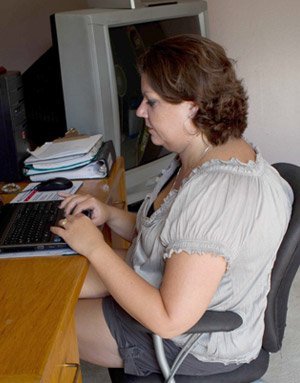Social Security makes every effort to ensure that any information published is accurate and up to date, but some information on this webpage may be historical.
Lisa's Success Story
Video Transcript
Sharon Ager: Lisa has grown so much in the work world and helping people. She really loves what she does with her career. She doesn't just think of it as a job where she punches and punches out. She plans on helping other people for a long, long time. Ticket to Work was one of the best things that ever happened for her. I can tell you that.
Lisa Seeley: I'm a work-from-home vocational counselor at Employment Options. I assist people who are on SSI (Supplemental Security Income) or SSDI (Social Security Disability Insurance) return to work. I specialize in work-from-home placements so what I do is I assess the client and then you know, depending on their skills and their you know, disability and things like that I, you know, help them return to work in a company that is suitable for their environment.
Paula Vieillet: Lisa's work is exceptional. She's a very good counselor. She has a big heart and that would be the kind of feedback I get from the clients. She tends to share her personal experiences with them, helping other people helps you get outside of your own problems so by helping someone else, I think that also helps her.
Lisa Seeley: I remember my first panic attack was at high school freshman orientation and I remember sitting there in the auditorium with you know, a room full of people or students and uh, just feeling like I was sick to my stomach and started feeling sweaty and dizzy and I'm just like oh my goodness, what's going on?
Sharon Ager: We had a hard time trying to find the correct help for Lisa. And it was hard to get the right medication.
Lisa Seeley: It just overwhelmed me and I had to actually have home tutoring my whole senior year in high school because anxiety just was overwhelming for me. I did work throughout high school. Um, I worked as a waitress but I suffer from anticipatory anxiety a lot too so I always had the "what ifs". What if I had a panic attack while I'm carrying this you know, food around? You know, what if this? What if that? So I didn't... I wasn't... you know, wasn't able to stay in a job for a long period of time. You know, I would quit because of the anxiety and then a couple months later I would you know, get another job.
Kevin Seeley: She'd have panic attacks so bad I'd have to go pick her up, calm her down. She'd try to go back to work but it just wouldn't happen so she's missing work.
Lisa Seeley: My panic disorder got you know, so bad that I was really uncomfortable leaving my house. I couldn't even walk across the street to check my mail and mailbox. Just the thought of going to the mall, driving, going grocery shopping or just simple everyday tasks were very difficult for me.
Kevin Seeley: I couldn't provide by myself in the profession I was in, and she's just like I know I've got to do something but I don't know what. Basically, the kids are what turned her around Social Security disability-wise. She knew she had to start working.
Lisa Seeley: I felt oh my gosh, I'm going to be on SSI for the rest of my life and I didn't want that. I wanted to feel productive but I needed to find someone that had work-from-home opportunities just because, you know, my disability did not allow me to drive or you know, go out into the community. So I called the 800 number, spoke with a representative there and I told them I was interested in the Ticket to Work program and I received a list of Employment Networks (ENs). I went through the list and chose an EN that wasn't a good fit for me so I [un]assigned my Ticket from them and reassigned it to Employment Options. I feel like I'm on top of the world. I feel like I can do anything and work has helped me get to that point. I actually hired an Agoraphobia coach. A woman that did suffer from Agoraphobia and she learned to harness her anxiety so now she was taking me out to the mall, you know we would go driving together. I felt uncomfortable but I did it anyway and that's what helped me is, I just kept doing it and kept doing it and you know, I do a lot of stuff now that I didn't do before. I travel. I would have never thought about flying on an airplane before, especially by myself you know, or being in a hotel room by myself but I love to travel now. I actually volunteer to travel for work. When I first started the Ticket to Work program, I didn't know anything about it and when I came to Employment Options, you know Paula told me, look, this is what's going to happen, you know, you're going to have nine months of where you could make as much money as you want and still have your benefits and uh, you know, be able to kind of test the waters to make sure that you're able to work and keep working. Going back to work, it's big. It's big in the aspect uh, financially, you know I am not on SSI or SSDI anymore. I'm able to be self-sufficient. Work has really boosted my self-esteem where you know, I just proved to myself that I can. I can return to work and I love working. I found my passion, you know. I feel really productive helping other people because I know how it felt to feel lost and insecure and uh, the Ticket to Work has really empowered me. It works. the Ticket to Work has really empowered me. It works.
If you are having difficulty viewing, visit our accessibility page for information on downloading plugins.
Home Base: Lisa's Story
 Published in 2013
Published in 2013
Lisa remembers high school orientation day vividly. It was the fall of 1990 and at fourteen, she was both excited and apprehensive. As she waited with her mother in the high school auditorium, a wave of nausea and vertigo hit without warning. Lisa was suddenly sweating. She had trouble breathing and her heart raced; she thought she was going to die of a heart attack. An ambulance brought her to the emergency room, where she learned she was having a panic attack. Lisa was diagnosed with a panic disorder and soon after, agoraphobia (fear of going out in public places). She struggled through adolescence with anxiety disorders that restricted her life.
Lisa earned a high school diploma through home schooling. But her disability interfered with so many aspects of her life that she and her family did not know how to manage. "Crowds and open spaces were very difficult for me to handle," she recalls. "After [getting my diploma], I hit rock bottom ... I had to move into a group home [because] my mom and I didn't know how to deal with my agoraphobia. I was lucky to be able to receive Social Security disability benefits, and receive the treatments I needed to get healthy again."
The Door Opens
Lisa received effective treatment in 2000 and felt ready be released from the confined space in which her anxiety held her. With help from an agoraphobia coach, cognitive behavioral therapy and medication, Lisa learned to do simple things that were not possible previously. Taking one step at a time, she began to drive to destinations near her home. Driving was particularly difficult, so this was a significant achievement. She visited local stores that drew small crowds. Then, with her coach, she finally went to a busy shopping mall. Her recovery was under way and Lisa found renewed confidence. She was determined to go to college and find employment.
In 2001, Lisa took classes online in psychology and early childhood development at Kayuga Community College. "To [complete] the year of school was huge for me," she recalls. "It lifted my self-esteem. I realized 'oh I can do this!'... and I wanted more. I found that I would really enjoy helping others with their life struggles, and I figured out that I’d rather work with adults who are kind of in the same boat as me. I felt like I was achieving goals, and knew it was a matter of time before I would [find suitable work]."
 A Welcome Detour
A Welcome Detour
In 2002, Lisa gained work experience in a few temporary jobs. Successful stints as a retail sales representative and as an employment counselor reinforced her instinct that she would have much to offer in a job that involved helping other people.
Then, later that year, she learned she was going to be a mother. She devoted the years that followed to caring for her son. His needs pushed her to venture outside of her comfort zone: to the pediatrician, to the playground, to "Mommy and Me" classes. Each new experience became more comfortable.
Lisa's treatment for agoraphobia and panic disorder continued. As her son grew and she felt ready to return to work, she explored her options.
"I always knew I wanted to work and feel productive. I wanted to help people in situations like my own. I was determined to start looking for work," she says. "It was a little overwhelming at first: battling anxiety disorder; worrying about losing my benefits... I was very nervous about [working]. I knew my disability would require accommodations, and I felt concerned about the anxiety interfering with long-term employment. But it was something I felt like I wanted to do badly. I hated having to rely on [Social Security] disability benefits."
Employment Networks
ENs offer free services through Ticket to Work that can help you prepare for, find or maintain employment.
Read tips on choosing the right EN. Use the "Find Help" tool to connect with providers who offer the services you need to start or advance your career.
 Work Incentives and Ticket to Work
Work Incentives and Ticket to Work
Lisa knew she needed help understanding how work would affect her Social Security disability benefits. She decided to do some research online and visited Social Security's Ticket to Work Program website at socialsecurity.gov/work. She read about Social Security rules, known as "Work Incentives." Work Incentives make it easier for adults with disabilities to enhance their job skills through education, training and work experience. While preparing to find and sustain employment, SSDI and SSI recipients like Lisa can still receive Medicaid or Medicare coverage and some cash benefits from Social Security. Social Security disability beneficiaries (age 18 through 64) are also eligible to receive free employment support services through the Ticket to Work program. Lisa decided to learn more about Ticket to Work and Work Incentives by calling the Ticket to Work Help Line.
The Help Line representative provided Lisa with a list of "Employment Networks" (ENs). ENs are authorized Ticket to Work service providers that help people prepare for work, find a job, or advance in their current position. Lisa found an EN called Employment Options, Inc. (EO). She was grateful to find attentive professionals who answered her questions and introduced her to resources that could help her succeed in the workforce.
Because she was concerned about whether her condition would be compatible with working in an office environment or commuting, Lisa wondered whether working from home could be an option.
Employment Options (EO) helped her plan for her future. She verified what she had learned about Work Incentives on the Ticket to Work website by talking to a benefits counselor. At EO, Lisa received career counseling and advice about job accommodations. Together they developed an Individual Work Plan, and decided her best option would be to work from home. Then something out of the ordinary happened.
What are Job Accommodations?
A job accommodation is a reasonable adjustment to a job or work environment that makes it possible for an individual with a disability to perform job duties. Accommodations may include specialized equipment, facility modifications, and adjustments to work schedules or job duties, as well as a whole range of other creative solutions.*
Through the Ticket to Work Program, an EN of your choice or your state Vocational Rehabilitation agency may offer free consulting services on accommodations that could make it easier for you to go to work.
*Source: US Department of Labor
“Employment Options, by chance, had an opening for a job counselor. When they learned that I had related work experience and saw my qualifications, they hired me!”
It is not common for an EN to hire the people they serve. But Lisa's EN had a need and recognized that she could fulfill it. Lisa now works from home and offers counseling services over the phone. Working from home accommodates Lisa's disability, and offers her the flexibility she needs now as a parent of two children. She is able to integrate work with running her household and says she has found the perfect job.
A New Outlook
"Working again has given me a new outlook..." she says. "Helping others with disabilities has been a dream of mine especially since I can put myself in my clients' shoes. There is no bigger reward than [getting] my clients back to work."
Lisa credits employment and the help she received through Ticket to Work with improvements in her life. She believes that working has been essential to her recovery. She no longer relies on Social Security benefits, and says that life is "wonderful."
"Working makes me feel empowered. It has helped me grow. I do not suffer any longer from agoraphobia. I actually travel to Florida for work meetings and look forward to the trips. I am now able to run a household while helping other people like me find their calling. I am so lucky to have found Employment Options. I would not have the... courage to go back to work [without them]. Thanks [to] Employment Options and the Ticket to Work Program, I have changed my life!"
With the right support, Lisa found her path to a better future. Find yours! To learn more, call the Ticket to Work Help Line at 1-866-968-7842 or 866-833-2967 (TTY).